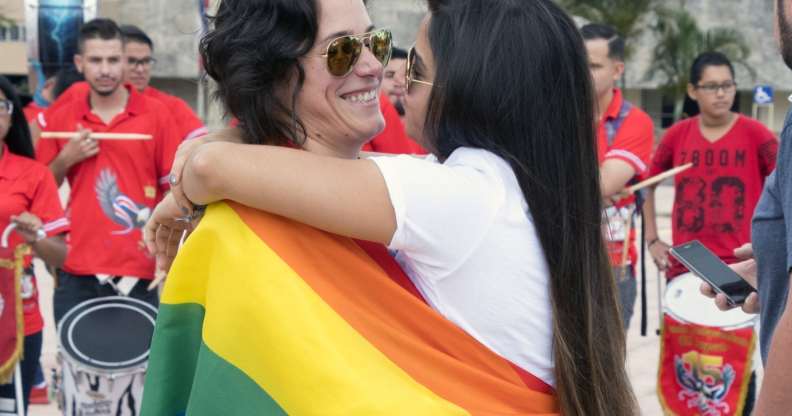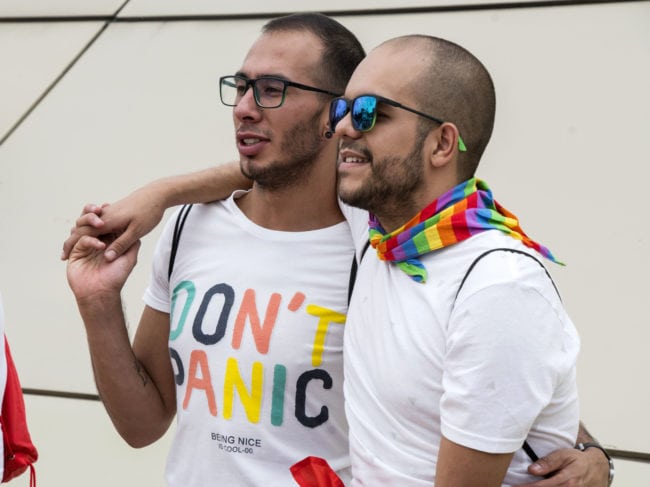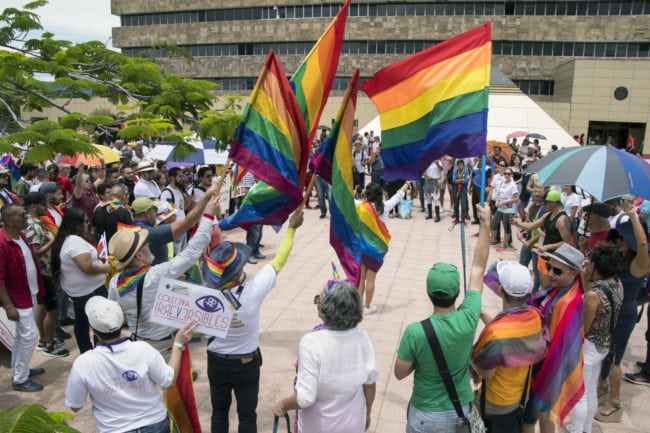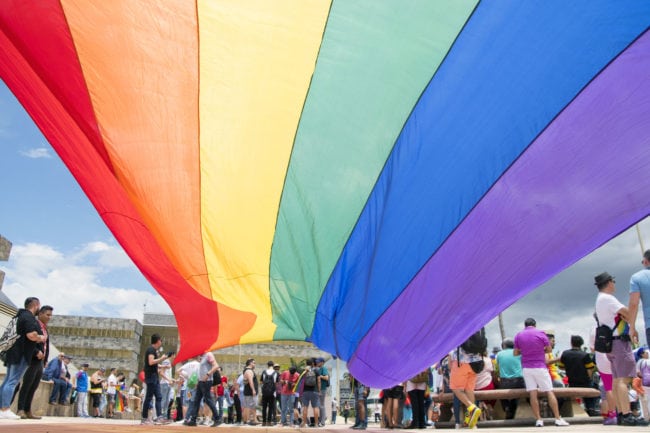Costa Rica ordered to legalise same-sex marriage in next 18 months

A couple is pictured during a demonstration in front of the Supreme Court of Justice in San Jose (EZEQUIEL BECERRA/AFP/Getty Images)
Costa Rica has been given an 18-month time limit to legalise same-sex marriage.
The country’s Supreme Court today ruled that it is unconstitutional to ban same-sex couples from getting married.
The ruling sets a time limit of 18 months for the legislature to implement changes through law.

A couple is pictured during a demonstration in front of the Supreme Court of Justice in San Jose (EZEQUIEL BECERRA/AFP/Getty Images)
If they do not do so, gay weddings will automatically become legal as the current ban on same-sex marriage will automatically cease to apply.
There is a large faction of evangelicals in Parliament who strongly oppose the change, but the country’s President Carlos Alvarado Quesada has welcomed the ruling and vowed to press for a law to implement it.
In a statement he said that “our commitment to full equality of rights remains intact” and that the Executive “respects the decision” of the court.
He added: “We trust that respect for human rights and the rule of law will prevail, whether the Legislative Assembly recognises equal marriage in the next 18 months, or failing that, once the time limit expires and the current law is made invalid.
“On our part, we will continue to promote actions that guarantee the non-discrimination of any person due to their sexual orientation or gender identity, and extend the protection of the State to all families equally.”

LGBTI activists demonstrate in front of the Supreme Court of Justice in San Jose (EZEQUIEL BECERRA/AFP/Getty)
Costa Rica’s 2017-18 presidential election was dominated by the issue of LGBT rights, after the Inter-American Court of Human Rights made an earlier ruling that human rights laws require the implementation of same-sex marriage.
In the wake of that ruling, fringe evangelical Presidential candidate Fabricio Alvarado Muñoz emerged from sixth place to become the frontrunner on the back of an aggressive anti-gay marriage campaign and a pledge to withdraw from human rights courts.
The centrist candidate Carlos Alvarado Quesada eventually saw off the anti-gay challenger in a run-off vote, by 60.59 percent to 39.41 percent.
Speaking at The Economist‘s Pride and Prejudice conference in May, former Costa Rican Vice President Ana Helena Chacón Echeverría said the divisions had been “hell.”
The politician said: “The country split in half. This was the issue. We weren’t talking about taxes or infrastructure or poverty, they were talking about gay rights, yes or no?
“It was like a referendum on gay rights. We went through torture during those months because, for the first time in my country, gay people were feeling fear. It was hateful.”

LGBTI activists demonstrate in front of the Supreme Court of Justice in San Jose (EZEQUIEL BECERRA/AFP/Getty)
She said: “Now we’ll have to do some things to change our laws so that everybody will have the same rights.
“For me, it was wonderful news, but we went through hell during those elections… it was very sad for me.
“They were talking about morals, values, traditional families, ‘the family is just a mother and a father and the kids and the dog’… but we are all families.”
She added: “I believe in dignity, I believe people should be happy. We have to raise our voices because we don’t want anyone to live with discrimination or stigma.”
The Costa Rica Supreme Court ruling cited the precedent from the Inter-American Court of Human Rights, which had found Costa Rica in violation of its treaty obligations under the American Convention on Human Rights (ACHR) by not providing marriage equality.
The human rights court decision could have knock-on effects elsewhere, as the IACHR has jurisdiction over 16 countries across the Americas.

